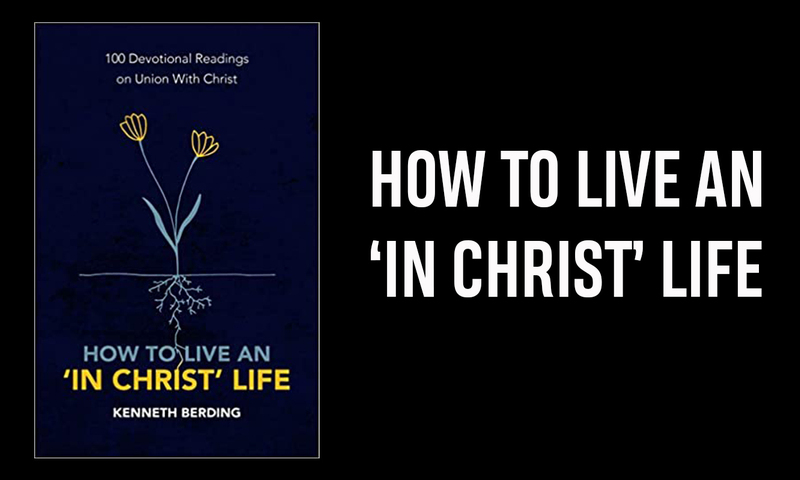Following is a little exercise I did while working on my new devotional book on union with Christ (what I refer to as inChristness in the book). I had noticed—like many before me—that Ephesians 1:3-14 is packed full of references to inChristness. Consequently, I decided to try to re-order the various clauses and phrases in the Paul’s famous paragraph with the goal of seeing more clearly Paul’s emphasis on union with Christ. In my first attempt at re-ordering Ephesians 1:3-14 below, I re-located words that centered on our union with Christ at the beginning of each line. [1]
Highlighting InChristness: Ephesians 1:3-14
May our Lord Jesus Christ’s God and Father be blessed.
In Christ, God has blessed us with every spiritual blessing in the heavenly places.
Just as in Christ God chose us before the foundation of the world.
That in Christ we might be holy and blameless before God.
Through Jesus Christ, God lovingly predestined us for adoption to himself as sons.
In Christ the beloved, this was done according to the purpose of God’s will, to the praise of God’s glorious grace.
In Christ and through the blood of Christ, we have redemption, the forgiveness of our trespasses, according to the riches of God’s gracewhich he lavished upon us, in all wisdom and insight.
In Christ, God made known the mystery of his will and set it forth according to his purpose as a plan for the fullness of time.
That in Christ all things might be united, things in heaven and things on earth.
In Christ we have obtained an inheritance, having been predestined according to the purpose of God who works all things according to the counsel of his will.
That in Christ, we who were the first to hope might be to the praise of God’s glory.
In Christ, when you believed in Christ, when you heard the word of truth, the gospel of your salvation, you were sealed with the promised Holy Spirit, who is the guarantee of our inheritance until we acquire possession of it, to the praise of God’s glory.
This first re-ordering underscores how incredibly significant is the idea that we have been united with Christ in this passage.
However, while I was doing this, I also could not help but notice that the work of God the Father is similarly emphatic in this passage. Consequently, in a second attempt at re-ordering the words of Paul’s paragraph, I attempted to highlight the work of God the Father in Ephesians 1:3-14 by bringing God to the front of each line. Here is the result of that exercise.
Highlighting the Activity of God the Father: Ephesians 1:3-14
May the God and Father of our Lord Jesus Christ be blessed.
God has blessed us in Christ with every spiritual blessing in the heavenly places.
Just as God chose us in Christ before the foundation of the world.
That before God we should be holy and blameless.
God, in love, predestined us for adoption to himself as sons through Jesus Christ.
God purposed this according to his will.
The praise of God’s glorious grace was the aim.
God has blessed us in Christ the beloved.
According to the riches of God’s grace, which he lavished upon us, we have redemption through the blood of Christ, the forgiveness of our trespasses.
God made known to us the mystery of his will in all wisdom and insight in Christ.
This was according to God’s purpose, which he set forth in Christ as a plan for the fullness of time, to unite all things in Christ, things in heaven and things on earth.
According to the purpose of God who works all things according to the counsel of his will, we have obtained an inheritance in Christ, having been predestined.
That to the praise of God’s glory, we who were the first to hope in Christ might live in Christ.
To the praise of God’s glory, when you heard the word of truth, the gospel of your salvation, and believed in Christ, you also were sealed with the promised Holy Spirit, who is the guarantee of our inheritance until we acquire possession of it.
This re-ordering exercise should function as a reminder of how emphatic union with Christ (or inChristness) is in the letters of Paul (re-ordering #1), and at the same time should remind us that Paul is insistent that God the Father has carried forth all his redemptive activities for the praise of his own glory (re-ordering #2).
For a devotional book containing 100 two-page devotional readings on union with Christ, see my new book: How to Live an ‘In Christ’ Life: 100 Devotional Readings on Union with Christ.
Notes
[1] There are some points in the passage where it is unclear whether a particular pronoun is referring to Christ or to God the Father. In these re-orderings, I have replaced a few of the pronouns with either “Christ” or “God” to remove some of the ambiguity.
This post and other resources are available at Kindle Afresh: The Blog and Website of Kenneth Berding.
 Biola University
Biola University

.jpg)
.jpg)

